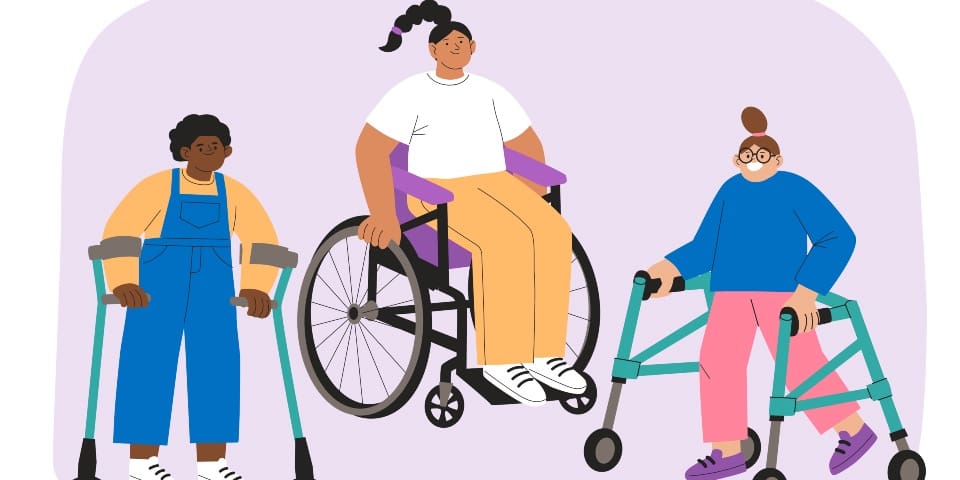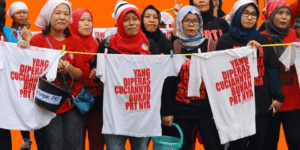One afternoon, Sri (40), was about to go to the second floor of the Islamic Center (IC) mosque in Lombok, West Nusa Tenggara (NTB). However, there were no escalator or elevators in the area of the large mosque.
Sri was finally carried by several people along with her wheelchair. Climb the stairs one by one to the second floor. With great effort.
At that time, women with disabilities were attending an event to meet the Minister of Women’s Empowerment and Child Protection (KPPA). Sri was invited as a representative of the Indonesian Women with Disabilities Association (HWDI).
“The committee carried me in a wheelchair to the second floor of the IC mosque,” Sri, who was then the Chair of the HWDI in West Nusa Tenggara/NTB, told me about the incident that happened about 6 years ago.
The incident will not be erased from her memory. Sri felt deeply traumatized. She regretted that a mosque as grand as IC was not friendly to people with disabilities. Accessible physical facilities for the disabled have not been fulfilled, such as guiding blocks or guides for the blind, ramps or wheelchair paths, wudhu places with supports, to special wheelchairs at the IC are also not yet available.
Not to mention, Sri said, the condition of the restroom which is still small is very difficult for women with disabilities like her. It also does not accommodate sign language translators for sermons, books written in braille, or in a digital format that is friendly to the disabled.
“Friends with disabilities can be independent and carry out worship activities if the facilities at the house of worship are appropriate,” said Sri, a woman born in Muhajirin, Central Lombok with a sad look on her face.
A similar experience was also experienced by Zinnurain (24), who once gave up her intention to perform the midday prayer at the Masjid Raya Al-Mujahidin Mosque, Selong, East Lombok, due to the lack of friendly facilities for persons with disabilities. She could not perform wudhu because there was no support.
“Cane users like me cannot perform wudhu without support,” said Zinnurain when I visited her house on Tuesday, March 29, 2022.
Zin is a woman with disability, a cane user from Sikur District, East Lombok Regency. In the last year of 2021, she stopped by this grandest mosque in East Lombok twice . Zin saw no improvement in inadequate facilities for disabled women.
The path for wheelchair users with a width of two meters, a place for wudhu, and a wheelchair in the prayer room are not yet visible. Zin hopes that there will be improvements and attention to facilities for disabilities at the Al-Mujahidin Grand Mosque.
Because it is so ironic, according to her, when the mosque was the most magnificent in Selong City, it did not yet provide proper facilities for the disabled in East Lombok.
Lack of Disability-Friendly Houses of Worship
Not only mosques, but many houses of worship, such as churches, mosques, temples, and monasteries were also found that did not provide proper facilities for disabled groups in Lombok, NTB. In early 2021, the Institute for the Study and Development of Human Resources (Lakpesdam) for the Nahdlatul Ulama NTB Region surveyed 300 houses of worship in Mataram City.
The results showed that none of the houses of worship provide adequate facilities for persons with disabilities, such as access ramps for wheelchair users, canes, information boards, wheelchairs in the prayer line, and sign language interpreters in houses of worship.
At the end of March 2022, my friends at the Rinjani Literacy School visited some places of worship in Mataram City. Among them are the Eternal Harvest Catholic Church, ST. Antonius Padua, IC Mosque, Po Hwa Kong Temple, and Avalokitesvara Vihara.
The lack of facilities for people with disabilities can be seen, for example, at the Panen Abadi Catholic Church, ST. Anthony Padua. Only the lane for the elderly is installed at the main door. Access ramps for wheelchair users are not visible in the church. Every month the church is visited by more than 500 congregations, of course, there are people with disabilities.
“Our congregation with disabilities here, there is one person. For worship activities, he follows other congregations in the church,” said Fransiskus (52), Head of the Secretariat of the Panen Abadi Catholic Church, Ampenan, whom we met that afternoon.
Likewise at the Po Hwa Kong Temple, which is located right on Yos Sudarso Street, Ampenan Old Town. Houses of worship for three religions; These Confucians, Taoists, and Buddhas also have not provided proper access for persons with disabilities.
The main entrance to the main prayer room only used a barrier the size of one brick. The barrier makes it difficult for wheelchair, elderly, and cane users.
According to a resident, Nyoman (51), the temple has not provided a special route for disabled congregations. For four years as a temple guard, every week he routinely helps the congregation with 5 people with disabilities.
“The temple management has not provided a special route for disable. However, every time a congregation who uses wheelchairs and canes comes, we help them enter through the side door,” said Nyoman.
The same thing also applies to the Vihara Avalokitesvara, Sweta, Mataram City. The temple administrators still do not provide proper access for people with disabilities.
“The temple administrator only provides wheelchairs and an entrance without stairs for disabled congregations,” said the Buddhist temple administrator, Yudiono (36).
Government and Society Need to Pay Attention to the Rights of Persons with Disabilities
As of 2014, the Central Statistics Agency (BPS) of NTB Province recorded that there were around 6,036 houses of worship. Mosques and prayer rooms are the largest in the order, reaching 5, 514 houses of worship spread over 518 villages. The rest are churches, monasteries, pagodas, mosques, and temples. No wonder, if the island of Lombok is called the Island of a Thousand Mosques.
Mataram State Islamic University (UIN) academic, Atun Wardatun said, the attention of the government and the community to people with disabilities is still very low, especially in mosques.
According to him, some of the indicators are the lack of disabled-friendly facilities such as wheelchair lanes, information boards, special wheelchairs for congregational prayers, Wudhu places, Braille Quran, and sermon sign language. As a result, limited access to places of worship makes it difficult for people with disabilities to carry out their worship comfortably.
“In Islam, there is no distinction between physical and non-physical forms. The mosque is an inclusive and equal place for women and men, disabled or non-disabled,” said Atun when met on the 2nd floor of the Sharia Faculty Building.
Atun suspected that the situation in Lombok, which lacks disability-friendly places of worship, is a systematic problem. Whereas in the regulations there are Law Number 8 of 2016 concerning Persons with Disabilities and Regional Regulation Number 4 of 2019 regulating the protection and fulfillment of the rights of persons with disabilities.
Those two regulations talk about the local government’s obligation to provide equal facilities for disabled groups in proper places of worship. However, its implementation is still largely neglected.
“IC has facilities for people with disabilities but they are not feasible. Especially access for women,” said the Director of Larimpu and the female researcher.
The Head of the Regional Technical Service Unit (UPTD) IC, Syarif Hidayatullah also confirmed the lack of facilities for the disabled at IC. According to him, access for people with disabilities is limited because the budget from the NTB Provincial Government is limited. He admitted that there had been no allocation for the provision of facilities to disable until this year.
“The facilities for disable at IC are not yet complete, the new IC has a path for wheelchairs, wudhu places, and lifts, but the stairs are not functioning yet,” said Syarif.
He also hopes that in the next fiscal year the need for people with disabilities will receive special financing. IC can be a model for houses of worship that provide decent and equal access for people with disabilities in NTB.
In addition to providing an adequate budget, disabled researcher and observer, Maya Rahmayati, emphasized that the NTB Regional Government should also be able to increase its sensitivity to creating inclusive places of worship for people with disabilities. Even all kinds of other public facilities.
The NTB local government also needs to raise awareness in the community to be able to jointly create a disabled-friendly house of worship. Because it is no less important than physical facilities.
“It will have an impact on equal access to the disabled group,” he concluded.
(This article is part of a fellowship organized by the Indonesian Family Planning Association (PKBI) in Jakarta)
(Translated by: Marina Nasution)












